Risk
The CALP Network’s State of the World’s Cash report found that the perception that CVA is riskier than other forms of aid was one of the main barriers to CVA being routinely used. This concern is linked to the growing emphasis from donors on anti-terrorism and money laundering, and shrinking budgets for humanitarian assistance. The CALP Network’s work under this theme aims to debunk myths, facilitate collaboration, and share learning to ensure that CVA is systematically and equally considered, based on evidence of actual risks across modalities.
Current priorities
A variety of organisations are currently working on CVA and risk. The CALP Network is working to identify synergies among actors, avoid duplication, and define joint priorities that can be better addressed collectively. Together with WFP, the CALP Network is co-leading the risk priority within the Grand Bargain workstream on cash.
Featured content

Podcast: Will risk aversion hold us back from realizing the potential of CVA?
Podcast
Episode 1 of the CashCast, exploring how attitudes to risk have impacted the use of CVA in the Middle East and North Africa region.

CVA and Risks: What happens in the field, stays in the field?
Blog Post
In October 2019 in Douala, Cameroon, the CALP Network facilitated a learning event exploring the risks to beneficiary protection in Cash and Voucher Assistance (CVA). This closed-door workshop, held as part of series of meetings and webinars on theme of CVA and risk in different regions, convened 25 humanitarian workers from West and Central Africa representing local and international NGOs, UN...

Webinar: Data sharing in CVA: ethics, ownership and privacy
Event
Thematic lead
Latest
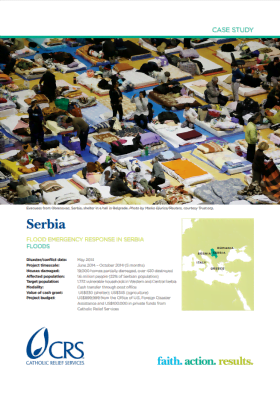
Using Cash for Shelter: Flood Emergency Response in Serbia
Case Study
The devastating floods that affected the Balkans in May 2014 affected 1.6 million people, 22 percent of Serbia’s population, and have set the country’s economic development back decades. Catholic Relief Services (CRS) conducted rapid assessments in 13 villages in the municipalities of Šabac, Valjevo,...

What to know: working with humanitarians on e-cash programs
Report
International humanitarian assistance rose to a record US$24.5 billion in 2014. The 2015 Global Humanitarian Assistance Report indicated that over US$200 million of this was used in cash and voucher programs. An increasing number of humanitarian actors have begun to deliver cash electronically, through...
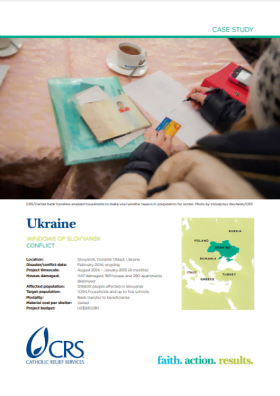
Using Cash for Shelter: Windows of Slovyansk
Case Study
After pro-Russian separatists declared republics in Eastern Ukraine in April 2014, Slovyansk became a focal point of fighting between government forces and rebels until the Ukrainian military retook the city in early July. Slovyansk saw the heaviest fighting of any urban area and many city dwellers fled....
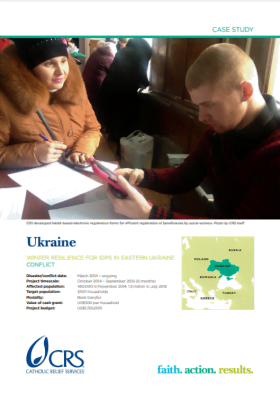
Using Cash for Shelter: Winter Resilience for IDPs in Eastern Ukraine
Case Study
Continued conflict in Eastern Ukraine during 2014 caused internal displacement of over 1.46 million people by September 2015, and another 1,123,800 fled to other countries, according to the United Nations High Commissioner for Refugees. Rapid assessments carried out by Catholic Relief Services found that...

Scale Right: Coordinating Improved Cash Assistance in Greece
Report
Europe is still reeling from the largest refugee crisis it has experienced since World War II. During the first half of 2015 Greece saw an average of 3,000 refugees arriving daily by sea onto the island of Lesvos. While the number of new arrivals—fleeing war in Syria, conflicts in Iraq, Afghanistan and...

Using Cash for Shelter: Rent Assistance for Syrian Refugees
Case Study
Over 600,000 Syrian refugees have arrived in Jordan since 2011; 80 percent of these live in urban or peri-urban locations rather than in camp settings. Families in this situation must pay rent for their shelter, and are therefore subject to shifts in rental market values. Rents have inflated substantially...
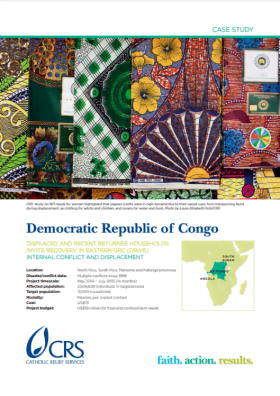
Using Cash for Shelter: Displaced and Recent Returnee Households Invite Recovery in Eastern DRC (DRIVE) Internal Conflict and Displacement
Case Study
The Democratic Republic of Congo, or DRC, has endured multiple conflicts since 1996, including armed conflict in Eastern DRC in 2012 and 2013. In December 2014, the United Nations Office for the Coordination of Humanitarian Affairs in the DRC reported that the armed conflict had internally displaced 2.72...

The Politics of Cash: A Case Study on Humanitarian Cash Transfers in Ukraine
Report
This case study examines the evolution of cash transfers in the humanitarian response in Ukraine. The use of cash transfers in Ukraine brought out the best and worst aspects of the international humanitarian system. Uncertainty over where cash fits into the humanitarian architecture – and whether...
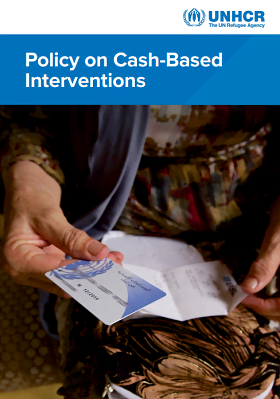
Policy on Cash-Based Interventions
Report
UNHCR’s Policy on Cash-Based Interventions (CBIs) is introduced herewith to expand and systematise the use of CBIs as a modality of assistance and service delivery across the organization and its operations worldwide. The Policy reconfirms UNHCR’s commitment to the increased use of CBIs and sets out...
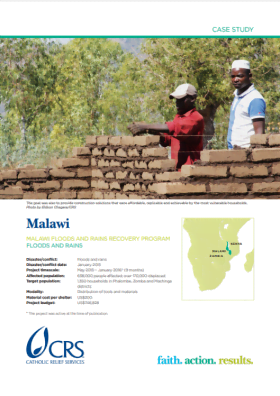
Using Cash for Shelter: Malawi Floods and Rains Recovery Program
Case Study
In January 2015, heavy rainstorms and floods affected 630,000 people in Malawi. Protracted immersion or flow of water damaged or destroyed dwellings and displaced over 170,000 people, with timber and roofing material also lost to the floods. Catholic Relief Services conducted a physical survey of...
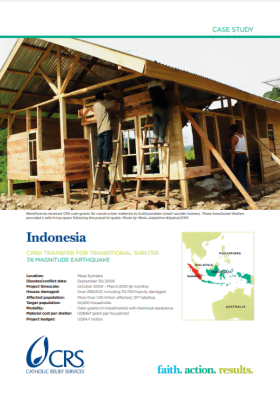
Using Cash for Shelter: Cash Transfer for Transitional Shelter
Case Study
An earthquake measuring 7.6 magnitude struck near the coast of West Sumatra, Indonesia, on September 30, 2009, affecting over 1.25 million people. Catholic Relief Services conducted rapid needs assessments in October 2009, identifying shelter as the most urgent need. Over 80 percent of the houses in some...
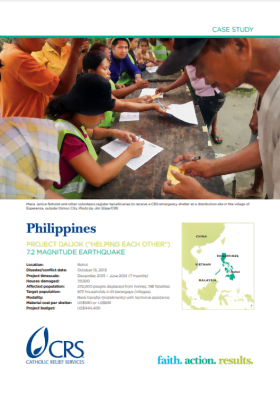
Using Cash for Shelter: Project Daijok ("Helping Each Other")
Case Study
After a major earthquake in the Philippines in October 2013, Catholic Relief Services reached 5,000 families with emergency shelter materials, water and hygiene kits, and emergency latrines. In November 2013, CRS staff conducted a housing and market assessment in three of the worst‑hit municipalities of...

The role of Cash Working Group Coordinator: Focus on Bangladesh
Blog Post
Multiple country cash working groups have emerged the past years to encourage the coordination of cash transfers across sectors. Eun Jung Yi, Coordinator of the Bangladesh Cash Working Group, presents some of the key achievements of the group within its first 12 months of existence.

Protection in Cash Based Interventions – Interviews with Richard Nunn and Lou Lasap
Blog Post
As part of an ECHO-funded Enhanced Response Capacity grant, UNHCR in partnership with WFP, Oxfam GB and the Cash Learning Partnership held an inter-agency workshop on cash and protection in Nairobi on the 10-12th March. The workshop brought together cash and protection practitioners to reflect upon...
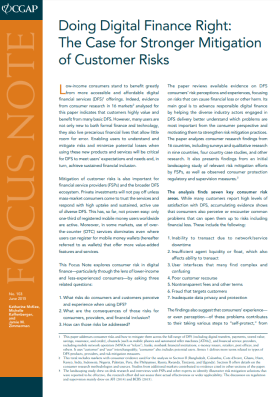
Doing Digital Finance Right: The case for stronger mitigation of customer risks
Policy paper
Low-income consumers stand to benefit greatly from more accessible and affordable digital financial services (DFS) offerings. Indeed, evidence from consumer research in 16 markets analyzed for this paper indicates that customers highly value and benefit from many basic DFS. However, many users are not...
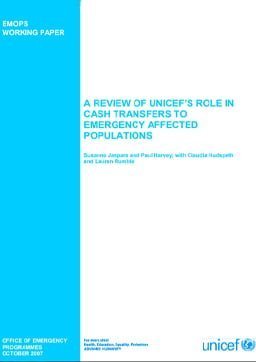
A Review of UNICEF’s Role in Cash Transfers to Emergency Affected Populations
Report
This paper is part of an ongoing process exploring UNICEF’s engagement with cash-based responses in emergencies. The main aim of the paper is to stimulate discussion on the potential role of cash transfers within UNICEF’s response to emergencies.
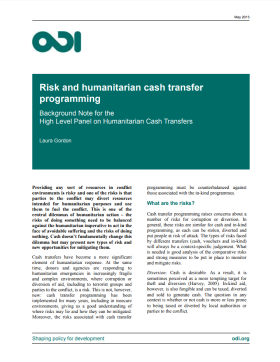
Risk and Humanitarian Cash Transfer Programming
Policy paper
Cash transfer programming raises concerns about a number of risks for corruption or diversion. Providing any sort of resources in conflict environments is risky and one of the risks is that parties to the conflict may divert resources intended for humanitarian purposes and use them to fuel the...

Part 1.4 Protection Risk and Benefits Analysis
Report
All humanitarian interventions carry risks, even in-kind delivery of goods and services. Cash programming is no exception. Specific areas of risk include:
Safety and dignity.
Humanitarian access to crisis-affected populations.
Crisis-affected populations’ access to aid.
Data protection and beneficiary...
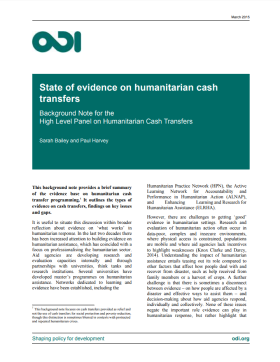
State of Evidence on Humanitarian Cash Transfers
Policy paper
The “State of evidence on humanitarian cash transfers” background note provides a brief summary of the evidence base on humanitarian cash transfer programming. The report also outlines the types of evidence on cash transfers, findings on key issues and gaps. This publication is an output of the...

Documentation and Learning: Rapid emergency assistance to Typhoon Ruby (Hagupit) affected communities in the province of Samar, Philippines April 2015
Report
The documentation and learning study identifies good practices and lessons from the implementation of the Rapid Emergency Assistance to Typhoon Ruby (Hagupit) Affected Communities in the Province of Samar by Christian Aid (CA) and its local NGO partners – Coastal Core Incorporated (CCI), Center for...



